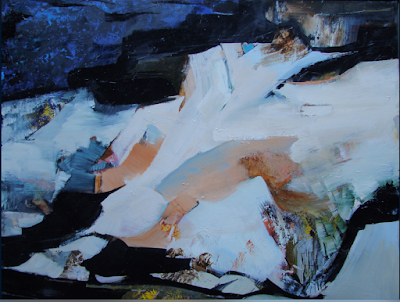 So already, today's been blue and white since early this morning, but I've been blue and bluer since early this afternoon. Not for any particular reason: I think it's the pandemic blahs or blues, a periodic affliction of many. And it's also a little bit of self-recrimination for having tried to attach my car's new registration sticker to my license plate without first removing my adhesive-seeking vinyl disposable gloves. It was ugly, I felt stupid, and wind blew colder than it ever should in May.
So already, today's been blue and white since early this morning, but I've been blue and bluer since early this afternoon. Not for any particular reason: I think it's the pandemic blahs or blues, a periodic affliction of many. And it's also a little bit of self-recrimination for having tried to attach my car's new registration sticker to my license plate without first removing my adhesive-seeking vinyl disposable gloves. It was ugly, I felt stupid, and wind blew colder than it ever should in May.But my state of mind makes this the perfect moment to write about the first poem read during the American Academy of Poet's "Shelter in Poems" virtual reading event on Thursday night, April 30. That night I was feeling similarly discouraged, resentful, and alienated when I promised myself I'd "attend" that event--at which I encountered "Time with Stevie Wonder* in It" by Christopher Gilbert, a poem I'd never heard of by a poet I'd never heard of.
 |
| Christopher Gilbert** |
Here goes! First of all, there's the title--"Time with Stevie Wonder in It"--what could be bad about time infused with Stevie Wonder's music? There aren't too many moments that music doesn't help. And given that there are so many moments these days when we're not as busy as usual, it's just a good time to be reading poems about time. Like Elizabeth Alexander says: it's just a great title.
- I always love poems about heading home, but I especially love them during our current moment that has been and continues to be so much about heading home, trying to stay at home, wishing we could be at home more, wishing we could be at home less, trying to be at home somehow, needing to stay at home if possible. And frequently our cars, if we have them, are one of the few places that we feel almost as safe as we feel at home.
- I love the physical force suggested by cold's being "like something stone,/ spit out, which is still a story/ and a voice to be embraced"--as well as the way the cold is recognized and respected as a story and a voice;
- I also love "Januaried"--the poet is taking language into his own hands for the sake of his own voice and story. Plus, it's a pretty word;
- Finally, I love the power of a familiar tune to transport the speaker home, whether his Lansing address is current or not.
Finally, I love the statement, "The beauty of the word,/ though, is the difference between language/ and the telling made through use." I wish I understood it, and I might someday. I also love that right after it, we're back on the snowy road with Stevie and Motown, en route to "a future happening with you in it." With all of us in it, I think.
 |
| "Oncoming Blue and White"**** |
* https://blogger.googleusercontent.com/img/b/R29vZ2xl/AVvXsEg8hFNP0isRqaz2cgFdCfZenVKNNxq1kUH4pSXZ8cY2FYcSyP3LZJTV6niNszWEMmvrT40tCMZmXhFFw1r2WcCozJbvkkanI5YpYbNSsVElyXZctQQT-inZcFV5Jju87GNFuYwdG_biwbo/s1600/Stevie+Wonder--Fingertips+45.jpg
** Photo on the Los Angeles Review of Books web site: https://lareviewofbooks.org/author-page/christopher-gilbert
*** https://usercontent1.hubstatic.com/3539966.jpg **** "Oncoming Blue and White" by Scott Ketcham: https://www.scottketcham.com/image/96304637992


For me it was (or wasn't) something annoying about a chill in the air in May. It's indignant. The malaise was somewhere between invited and stonelike, yes.
ReplyDeleteTWSWII is rhythmic and engaging. It wants to be read again immediately. I think I will.
As for feelings, meh. I ain't special.
The music battling and bringing folks back home brings me home as well. I am twelve years old and it is warm.
Delete"The crystals show a future
With you in it" brings me great joy. It just does.
"I am twelve years old and it is warm." I think that's the first line of a poem. I love that we share a love of that last line, Berhan!
ReplyDeleteGot to be a good poem then. As a native Florida boy, twelve and sunny is my safe place 💛
Delete